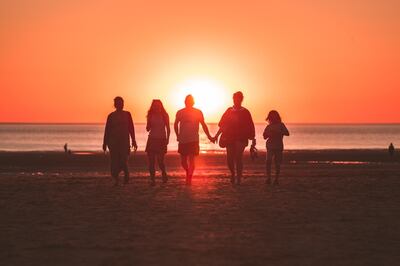Travel is finally back on the agenda after months of movement restrictions and border closures around the world. As rules and regulations are relaxed, hotels are once again receiving bookings and airlines have reported an increase in demand.
In Europe, many travel restrictions were lifted in June, meaning some countries have now had almost two months of travel time. This head-start has given experts the chance to reflect on holiday habits in a post-Covid-19 landscape.
A new report by McKinsey uses data from metasearch travel agent Trivago about the reopening of the German travel market to pinpoint what to expect as the rest of the world begins to emerge from travel hibernation.
In a world so drastically changed by the pandemic, traveller habits have, perhaps unsurprisingly, shifted. This is what we can expect to see in the travel landscape of tomorrow …
1. People still want to travel

Despite all the movement restrictions, the safety precautions, the financial impact and the risks related to travelling during the pandemic, people are still keen to do so.
In Germany, online search traffic for holidays has now recovered to about 55 per cent of where it was in a pre-pandemic world. During the country’s lockdown, this figure dipped to about 10 per cent of its former volume so it is reassuring for the tourism industry that the rebound has happened so quickly.
In the UAE, a similar uptake was noted in late June, when travel restrictions were first eased in Dubai. According to travel metasearch engine Wego, travel search activity in the UAE region saw a consistent recovery throughout June.
The sentiment continues across the globe. A new MasterCard-Crescent Rating study looking at how Covid-19 has affected Asean countries found that, despite financial implications of the pandemic, the majority of people in Thailand, Malaysia, the Philippines, Singapore, Australia and South Korea plan to travel when restrictions are lifted.
2. Domestic travel reigns supreme

For the first time in several years, domestic travel is now more popular than international travel, McKinsey's report found. Historically, German travellers have preferred international travel over domestic holidays but that’s all changed. In June, McKinsey says there was a 36 per cent higher demand for domestic travel in the European country than for international travel.
A similar pattern is emerging in the UAE. Wego recorded the most searched for destination in June to be the Emirates, showing a growing appetite for domestic travel. Several other countries are following suit and travel companies have already started to adapt. Princess Cruises's newest itinerary is a ‘Closer to Home’ cruise that ditches exotic destinations in favour of sailing UK travellers around the waters of England, Wales, Scotland and Ireland.
3. There will be more last-minute bookings

Who would have guessed in March this year that the majority of holidays planned for summer would be cancelled? The coronavirus pandemic has turned the travel industry on its head and although things are slowly restarting, travelling is far from plain sailing.
Constantly changing restrictions, airport closures, flight cancellations and new border rules mean it is now significantly harder to plan travel. When Europe lifted restrictions for several countries on June 15, there was a rush of last-minute holiday bookings in Germany – despite the peak holiday period typically being later in the summer.
According to the McKinsey report, this year’s share of holidays that start within 30 days of the time of booking exceeds the same period last year by 7 per cent. Travellers are perhaps more confident booking trips closer to the date that they want to travel in the hope that rules and regulations won’t have dramatically changed by the time the holiday rolls around.
4. Holiday hotspots remain firm favourites

Domestic travel aside, it seems that most travellers are not ready to give up on their favourite destinations despite Covid-19 restrictions.
For German travellers, Austria and the Netherlands have always been among the most-visited countries and bookings to both have been on the rise since May.
While this may also be down to the fact that these countries are right next door, it’s proof that Covid-19 won’t turn people off a destination. Italy, a country that was one of the hardest hit by the virus, remains another top choice for German holidaymakers.
From the UAE, travellers are most keen to travel to Egypt. This is in keeping with a ranking of popular destinations carried out by Wego in 2019, which also had Egypt as the number one travel spot. India, the Philippines and Turkey are also among the top searched for destinations by UAE trip-planners. This reflects similar findings last year, when Wego ranked all three of these destinations in the top five favourite destinations for UAE travellers.
5. New places closer to home will shine

With domestic travel on the up, travellers are keen to find undiscovered places and different destinations in their home countries, especially if that means being around nature.
In Germany, coastal regions like Mecklenburg and Schleswig Holstein saw a significant increase in visits this year, says McKinsley’s report. Alongside mountain locations and other nature-focused regions, the country's domestic coastal destinations have been more in demand since the outbreak of the crisis.
This could lead the way for some new regional favourites – perhaps it’s time for Umm Al Quwain’s mangroves or Ajman's Masfout to take the spotlight?
6. Holidays will be longer

The average length of a holiday is set to get longer post-Covid. With several new rules in place for travellers like having to secure negative Covid-19 test results and purchase valid travel insurance policies before holidaying, people are trying to make the most of their time away by travelling for longer. In the German market, demand for trips longer than seven days has not only recovered to pre-crisis levels, but exceeded them.
Similarly, UAE travellers searching for flights on Wego in June seemed to be planning to travel for longer periods, with the average duration of trips searched on the site lasting from 7 to 14 days. This trend could also be related to the financial impact of the crisis, with travellers perhaps choosing to skip weekend getaways and short breaks in favour of longer summer holidays with their families.
7. Nature is in demand

In an effort to restart tourism, many hotels, travel agents and tour operators have lowered their prices, meaning there are bargain trips to be had. However, there’s one sector where prices look set to remain high. Nature-oriented holidays such as those in mountain, coastal or forest locations are still demanding 2019-level prices or even higher, and travellers are willing to pay it, according to McKinsey. The same cannot be said for travellers searching for city breaks, where the average price of a booking has fallen since last year.







